Related Research Articles

Thomas Giles Robinson is a British singer, bassist, radio presenter and long-time LGBT rights activist, best known for the hits "Glad to Be Gay", "2-4-6-8 Motorway", and "Don't Take No for an Answer", with his Tom Robinson Band. He later peaked at No. 6 in the UK Singles Chart with his solo single "War Baby".
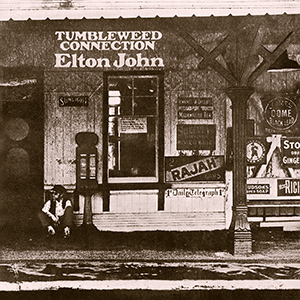
Tumbleweed Connection is the third studio album by English singer-songwriter Elton John. It was recorded at Trident Studios, London, in March 1970, and released in October 1970 in the UK and January 1971 in the US. It is a concept album based on country and western and Americana themes. All songs are written by John and Bernie Taupin, with the exception of "Love Song" by Lesley Duncan.

21 at 33 is the fourteenth studio album by British musician Elton John. It was released on 23 May 1980, through MCA Records in the US and The Rocket Record Company in all other territories. The album was co-produced by John and Clive Franks, and was primarily recorded in August 1979 at Super Bear Studios in Nice, France. The record was the first since Blue Moves (1976) to feature lyrics written by Bernie Taupin, while John also continued to experiment with other lyricists, including Gary Osborne and Tom Robinson. Contributors to the album include members of Toto and the Eagles, as well as Dee Murray and Nigel Olsson, marking their first appearance on an Elton John album since Captain Fantastic and the Brown Dirt Cowboy (1975).

The Fox is the fifteenth studio album by English musician Elton John, released in 1981. The album was produced by John, Clive Franks, and, for the first time, Chris Thomas, who would produce many more albums with John through most of the 1980s and 1990s.
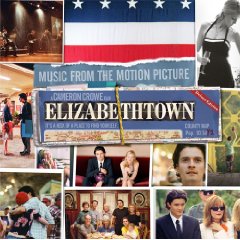
The soundtrack for the film Elizabethtown, directed by Cameron Crowe, constitutes multiple volumes released by RCA Records between 2005-2006. The first volume of original songs from the movie, titled Elizabethtown: Songs from the Motion Picture, was released September 13, 2005. The physical CD release of this first volume remains in print at the time of writing, but is not as pictured here, featuring instead the red cover art seen on AllMusic, and does not include the last song "Plush" referenced by the track listing here. The original score, composed by rock musician Nancy Wilson, was released on October 14, 2005. The four-song extended play Songs for the Ride Home was released as a limited-time iTunes Exclusive on December 20, 2005. A full-length follow-up collection, titled Elizabethtown: Volume 2, was released on February 7, 2006, and replaced Songs for the Ride Home on iTunes

Sir Elton Hercules John is a British singer, songwriter and pianist. Acclaimed by critics and musicians, particularly for his work during the 1970s, his music and showmanship have had a significant, lasting impact on the music industry. His songwriting partnership with lyricist Bernie Taupin is one of the most successful in history.
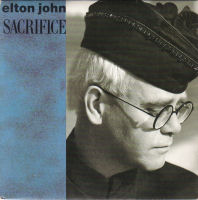
"Sacrifice" is a song by British musician Elton John, written by John and Bernie Taupin, from John's 22nd studio album, Sleeping with the Past (1989). It was first released in October 1989 as the second single from the album. It achieved success in 1990, particularly in France and the United Kingdom, becoming John's first solo chart-topper in both nations. The song describes how hard it is to stay faithful and devoted in a marriage, challenging the mantra that a successful union requires sacrifice. Due to the song's success, John has played this song in various locations in the years since it was released.

"Club at the End of the Street" is an upbeat pop rock song composed by English musician Elton John with lyrics by Bernie Taupin. It was included on John's album Sleeping with the Past in 1989 and released as its third single in 1990. The song describes a night on the town between two lovers at an undisclosed nightclub. In 2013, John stated on Rolling Stone that this song was one of his favourites. The song featured an animated music video. He performed it three times live during the One Night Only concerts in 2000.

"Nikita" is a song by English musician Elton John from his 19th studio album, Ice on Fire (1985). It was released as the album's lead single on 4 October 1985, charting at number three on the UK Singles Chart, peaking at number seven in the United States, and reaching the top 10 worldwide, topping the charts of eight countries. The song features George Michael on backing vocals and Nik Kershaw on guitar.

"I Guess That's Why They Call It the Blues" is a song by English musician Elton John, with music by John and Davey Johnstone and lyrics by Bernie Taupin, released as the first single from John's 17th studio album Too Low for Zero. It was the first single since 1975's "Someone Saved My Life Tonight" to feature the classic lineup of the Elton John Band.
"Come Down in Time" is the second track on Elton John's third album, Tumbleweed Connection, released in 1970. The lyrics were written by Bernie Taupin, Elton's long time writing partner. The song was originally recorded for John's second album, Elton John.

"This Train Don't Stop There Anymore" is the final track on Elton John's 2001 album Songs from the West Coast. Written by John and Bernie Taupin, the song's lyrics detail John's fame being over and his coming to terms with getting older but still keep touring and giving great performances around the world. It was released as the second single from the album and reached No. 24 in the UK Singles chart and was a Top 10 Adult Contemporary chart hit in the US. The song was less successful in the Netherlands, reaching No. 83.

Dream Ticket is a four-disc DVD release of Elton John, compiling three concerts and an additional bonus disc of music videos. It was released in 2004.
Lesbian, gay, bisexual, transgender, and queer+(LGBTQ+)music is music that focuses on the experiences of gender and sexual minorities as a product of the broad gay liberation movement.
Breaking Hearts Tour was the North American leg of the Elton John Breaking Hearts Tour. The European leg was dubbed "European Express". The tour started on 17 August 1984, at Tempe, Arizona. It included five sold-out concerts in New York City performed at Madison Square Garden.
The Jump Up! Tour was a worldwide concert tour by English musician and composer Elton John, in support of his 16th studio album Jump Up!. The tour included five legs and a total of 135 shows.
"Teacher I Need You" is a song written by English musician Elton John and songwriter Bernie Taupin, and performed by John. It was first released on John's 1973 album Don't Shoot Me I'm Only the Piano Player. The lyrics tell of a schoolboy's crush on his teacher, and the music evokes the sound of 1950s songs.
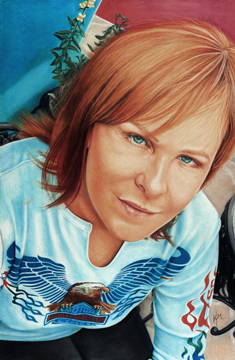
Maxine Feibelman is a former seamstress for California bands who was married for several years to Elton John's frequent collaborator Bernie Taupin. Her romance, marriage, and break-up with Taupin influenced some of Taupin's and John's songs, she provided the title and refrain for one of their songs, and she supported John's path toward his distinct stage costume style.
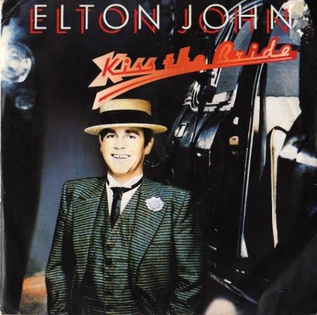
"Kiss the Bride" is a song by English musician Elton John, from his 17th studio album, Too Low for Zero, written by John and Bernie Taupin. Released as the album's third single, the upbeat song was a top 40 hit in many countries. It reached No. 20 on the UK Singles Chart, No. 25 on the US Billboard Hot 100 chart, No. 25 in Australia, No. 37 in Canada, No. 17 in Ireland, and No. 32 in New Zealand. In Germany, the song peaked at No. 58.
"We All Fall in Love Sometimes" is the ninth track on Elton John's album Captain Fantastic and the Brown Dirt Cowboy, written by John (music) and Bernie Taupin (lyrics), and released in 1975.
References
- ↑ "His song" by Elizabeth Rosenthal
- 1 2 Donald Gibson (15 September 2019). Elton John FAQ: All That's Left to Know About the Rocket Man. Rowman & Littlefield. p. 219. ISBN 9781617137020.
- 1 2 Claude Bernardin; Tom Stanton (1996). Rocket Man: Elton John from A-Z. Greenwood Publishing Group. p. 85. ISBN 9780275956981.
- 1 2 Cameron Crowe (October 10, 2013). "Elton John: My Life in 20 Songs - Cameron Crowe explores Elton's journey from Reginald Dwight to technicolored pop sensation to rehab and back". Rolling Stone magazine. Retrieved April 15, 2021.
- ↑ The Fox album and liner notes.
- ↑ "Elton's Song by Elton John | Song Statistics | setlist.fm". www.setlist.fm. Retrieved 25 August 2022.
- ↑ Elton John - "Elton's Song" (Official Music Video)